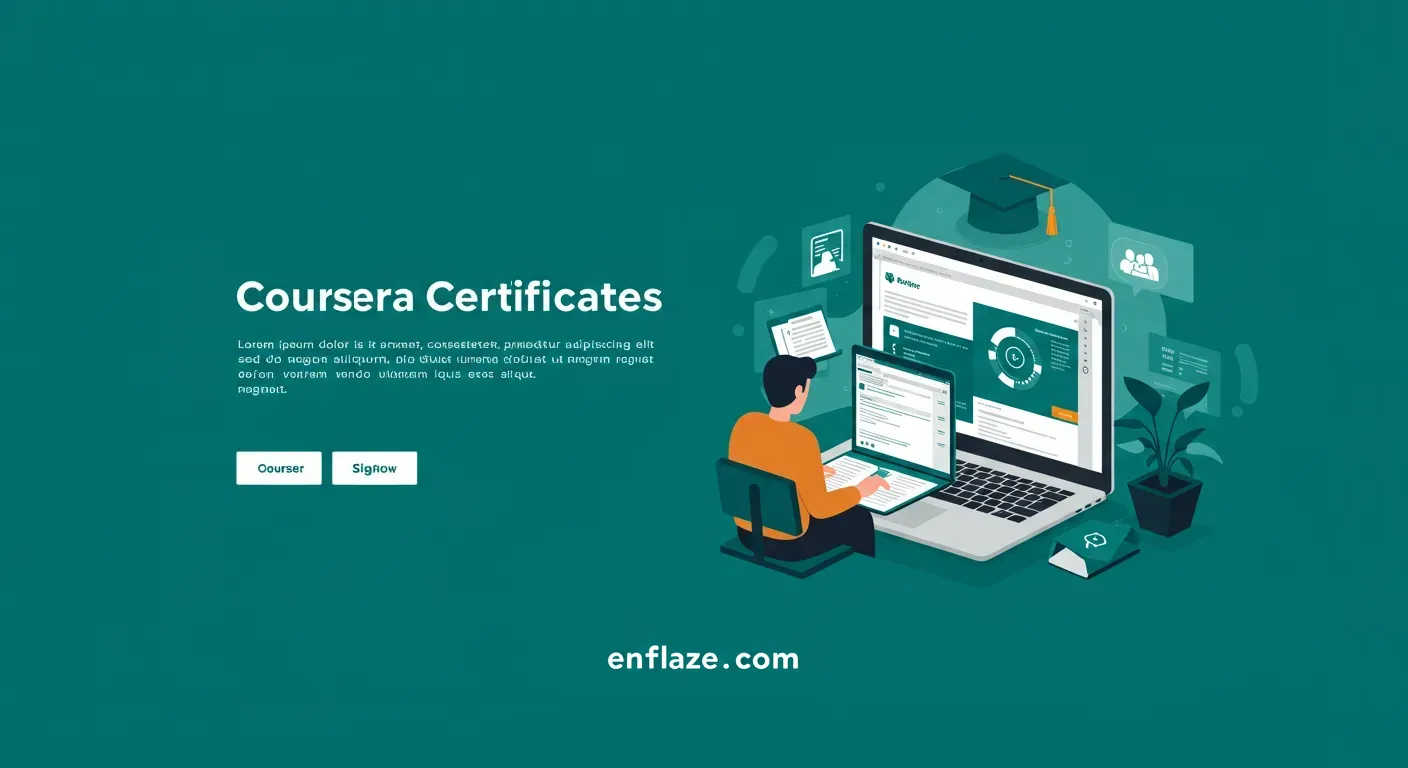The world of online learning is booming. With an estimated value in the hundreds of billions, and a projected Compound Annual Growth Rate (CAGR) of around 9.1% from 2024 to 2032 (source), it is not slowing down any time soon. As more and more individuals seek to upskill, reskill, or simply expand their knowledge, online courses have become a popular and accessible option.
Coursera, a leading platform in this space, offers a wide array of courses and certifications from top universities and industry partners. But with so many learning options available, a common question arises: Is a Coursera certificate worth it?
In this article, we’ll take a deep dive into the value and recognition of Coursera certificates. We’ll explore the different types of certificates offered, their potential benefits, how they’re perceived by employers, and the all-important cost-benefit analysis.
By the end, you’ll have a clearer understanding of whether a Coursera certificate is the right investment for your personal and professional goals.
What are Coursera Certificates?
Coursera partners with over 275 leading universities and companies (source), including names like Yale, Google, and IBM, to offer a diverse range of learning programs. Certificates are a significant part of their offering, and they come in a few different flavors:
1. Different Types
- Specializations: A series of related courses designed to help you master a specific skill or topic. They often culminate in a capstone project.
- Professional Certificates: Developed by industry leaders, these programs aim to prepare you for specific in-demand jobs.
- MasterTrack™ Certificates: These are portions of Master’s programs, split into online modules, allowing you to earn university-issued certificates. Some even offer a pathway to credit towards a full degree upon acceptance into said program.
- Guided Projects: Short, hands-on projects that allow you to learn a specific skill in under two hours. While less comprehensive than other certificate types, they still provide a certificate of completion.
- Certificates: Courses which are a part of Specializations, can also be taken, and have certificates awarded individually.
2. Structure
Most Coursera certificate programs involve:
- Video lectures
- Readings
- Quizzes and assessments
- Peer-graded assignments
- Projects (often for Specializations and Professional Certificates)
The Value Proposition: What Do You Gain?
Earning a Coursera certificate can offer several potential benefits:
1. Skill Development
Coursera courses are designed to teach practical, in-demand skills that are relevant to today’s job market. Whether it’s data science, project management, or digital marketing, you can acquire valuable skills that employers are looking for.
2. Knowledge Acquisition
With courses from top universities, you’re not just learning skills; you’re gaining in-depth knowledge from leading experts in their fields.
3. Career Advancement
A certificate can be a valuable asset on your resume, signaling to potential employers that you’re committed to professional development and possess specific skills. It can potentially lead to promotions, new job opportunities, or even a complete career change.
4. Personal Enrichment
Beyond career benefits, learning new things is intrinsically rewarding. A Coursera certificate can be a testament to your personal growth and commitment to lifelong learning.
Recognition and Credibility
A crucial question is whether employers actually recognize and value Coursera certificates. The answer is nuanced and depends on several factors.
1. Employer Perception
While there isn’t extensive publicly available data on employer perception, anecdotal evidence and online discussions suggest that Coursera certificates are generally viewed positively, particularly those from well-known universities or industry partners. However, they are often seen as supplementary to, rather than a replacement for, traditional degrees. Many employers do recognize them, and they are a great way to up-skill, or show commitment in a certain area.
2. Industry Recognition
In some industries, particularly tech, Coursera certificates are becoming increasingly recognized, especially for specialized skills. For example, Google’s Professional Certificates are designed to prepare learners for entry-level roles in high-growth fields.
3. Comparison to Traditional Education
It’s important to understand that a Coursera certificate is generally not equivalent to a traditional college degree. However, it can be a valuable addition to your educational background, demonstrating specialized knowledge and skills.
4. Accreditation
Some, but not all, Coursera certificates offer a pathway to academic credit. For instance, certain MasterTrack™ Certificates can count towards a full degree if you are accepted into the corresponding Master’s program.
Here’s a table summarizing the recognition aspect:
| Feature | Coursera Certificate | Traditional Degree |
| Employer Perception | Generally positive, especially from reputable institutions; seen as supplementary | Generally highly valued; often a prerequisite for many jobs |
| Industry Recognition | Growing, especially in tech and for specialized skills | Widely recognized across all industries |
| Equivalency | Not equivalent to a degree, but can be a valuable addition | Considered the standard for formal education |
| Accreditation | Some MasterTrack™ Certificates offer a pathway to academic credit towards a full degree if accepted into the program. | Degrees from accredited institutions are fully accredited |
Cost vs. Benefit Analysis
Coursera certificates vary in price. Some individual courses can be taken for free (without a certificate), while others are part of paid programs:
- Individual Courses: Many can be audited for free, or a fee is charged to participate in assignments, and for a certificate upon completion.
- Specializations/Professional Certificates: Typically involve a monthly subscription fee (around 39−99 per month), often taking a few months to complete.
- MasterTrack™ Certificates: Can range from a $2,000 – $5,000
- Coursera Plus: An annual subscription (around $399) that provides unlimited access to a large portion of Coursera’s catalog, including many Specializations and Professional Certificates.
1. Return on Investment (ROI)
Determining the ROI of a Coursera certificate is highly individual. Factors to consider include:
- Potential Salary Increase: Research average salaries for roles requiring the skills you’ll gain.
- Career Advancement Opportunities: Consider whether the certificate will open doors to new job opportunities or promotions.
- Cost of the Certificate: Factor in the total cost of the program.
- Time Commitment: Evaluate the time you’ll need to invest in completing the certificate.
2. Financial Aid
Coursera does offer financial aid and scholarships for learners who cannot afford the full cost of a certificate program (source).
Factors to Consider
Whether a Coursera certificate is “worth it” ultimately depends on your individual circumstances:
1. Your Goals
Are you looking to change careers, upskill in your current role, or learn something new for personal enrichment?
2. Specific Certificate
The value can vary significantly depending on the program. Research the specific certificate you’re interested in and its relevance to your goals.
3. Your Effort and Commitment
Like any educational endeavor, the more you put into a Coursera program, the more you’ll get out of it.
Alternatives to Coursera Certificates
1. Other Platforms
Platforms like edX, Udacity, Skillshare, and LinkedIn Learning offer a wide range of courses and certifications, some of which may be better suited to your needs.
2. Free Courses
Many platforms, including Coursera, offer free courses (without certificates) that can be a great way to explore a subject before committing to a paid program.
3. Traditional Education
Depending on your goals, a traditional degree or diploma program might be a more appropriate option.
Conclusion
So, is a Coursera certificate worth it? For many learners, the answer is a qualified yes. Coursera certificates can be a valuable asset for career advancement, skill development, and personal enrichment. They offer a flexible and accessible way to gain in-demand skills and knowledge from top institutions. However, it’s essential to consider your individual goals, the specific certificate program, and the potential ROI.
Ultimately, the decision of whether or not to pursue a Coursera certificate is a personal one. Weigh the factors we’ve discussed, explore Coursera’s offerings, and determine if it’s the right path to help you enflaze your potential.
Ready to explore what Coursera has to offer?


